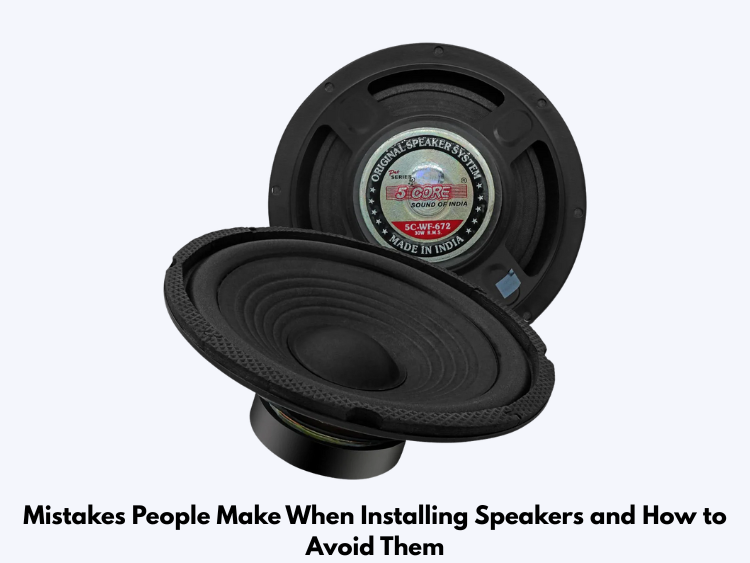You might think that putting in speakers is a simple job, but many people make some mistakes that ruin the sound and even shorten the life of their system. No matter if you’re setting up a home theater, car audio, or speakers outside, making small mistakes can damage the system or make the sound bad. We’ll talk about some of those mistakes and show you how to avoid them so your sound system works at its best in this article.
Too Close to Walls
Putting speakers too close to walls or corners is one of the most common mistakes people make when setting them up. Even though it might be tempting to tuck speakers into empty areas, this can make the sound worse. The bass response gets boosted, which can make the sound muddy and distorted, and higher notes can get lost.
To avoid this:
Speakers should be placed a few feet away from corners and walls. This space makes it easier for sound to spread out and keeps the bass from getting too loud. When setting up a home theater, putting the front speakers at ear level and slightly tilting them toward the hearing area makes the picture feel more real. You might want to use speaker stands or wall mounts to put them in the best place.
Looking for better speaker options? Check out the best replacement speakers for home audio in 2025.
Ignoring Speaker Impedance
The amount of resistance a speaker has to the electricity coming from an amplifier is called its impedance. If you choose speakers with the wrong voltage for your receiver or amplifier, you could damage it or get less-than-ideal sound. Some home audio systems may work with 4-ohm speakers, but most need speakers with an impedance of 8 ohms.
To avoid this:
Always look at the amplifier and speaker specs before buying them. Make sure that the impedances of both are the same. If you’re not sure, look at the product instructions or get help from a professional.
Wiring Mistakes
If your wiring is wrong or not very good, it can really affect how well your sound system works. Signal loss, low loudness, and fuzzy sound can happen if you use thin, low-quality cords or connect the wires incorrectly.
How to avoid it:
Buy good speaker lines with the right gauge size for the distance and power needs of your system. Make sure the links between the wires are tight and that the speaker and amplifier’s positive and negative ends are matched up properly.
Not Considering Room Acoustics
What kind of sound you get from your speakers depends a lot on how the room sounds. A room’s size, form, and furniture often go unnoticed until it’s too late.
How to avoid it:
Think about how the room sounds before you decide where to put your speakers. Adding soundproofing materials like foam walls or bass traps can make the sound better overall.
Need help choosing between bass-heavy options? Here’s a guide on whether you need a woofer or a subwoofer.
Bad Placement
Where you put your speakers is very important for getting the best sound quality. If the speakers are not placed correctly, they might not have a good stereo image or bass response.
To avoid it:
In a stereo system, the speakers should form a triangle with the listener. In a home theater, place the center channel directly in front of the listener, at ear level, and surround speakers slightly behind and to the side.
Overloading the System
A lot of audiophiles want to get the most out of their gear, but they might push it too far. Playing at high volume for a long time can damage speakers.
To avoid it:
Don’t turn up the sound all the way for long periods. Check that your amplifier or receiver can power your speakers properly.
Explore high-efficiency options from our list of top 5 car replacement speakers for superior sound quality in 2025.
Skipping Calibration
It’s easy to forget to calibrate the system after setup. But without this, your system might not work its best.
To avoid it:
Use auto-calibration tools or manually adjust the speaker levels and distances for optimal performance.
Poor Power Supply
Speakers need a clean power source. Bad plugs or overcrowded outlets can introduce hum or interference.
To avoid it:
Use grounded outlets, surge protectors, or power conditioners. Avoid running audio gear on the same circuit as high-power devices.
Conclusion
If you don’t make these common mistakes when installing speakers, your system will sound better and last longer. You can make the best sound setting for success and pleasure by carefully considering where to put speakers, how to wire them, and how to calibrate them. Taking the time to place your speakers correctly not only makes the sound better, but it also makes sure that your equipment works at its best for longer.




